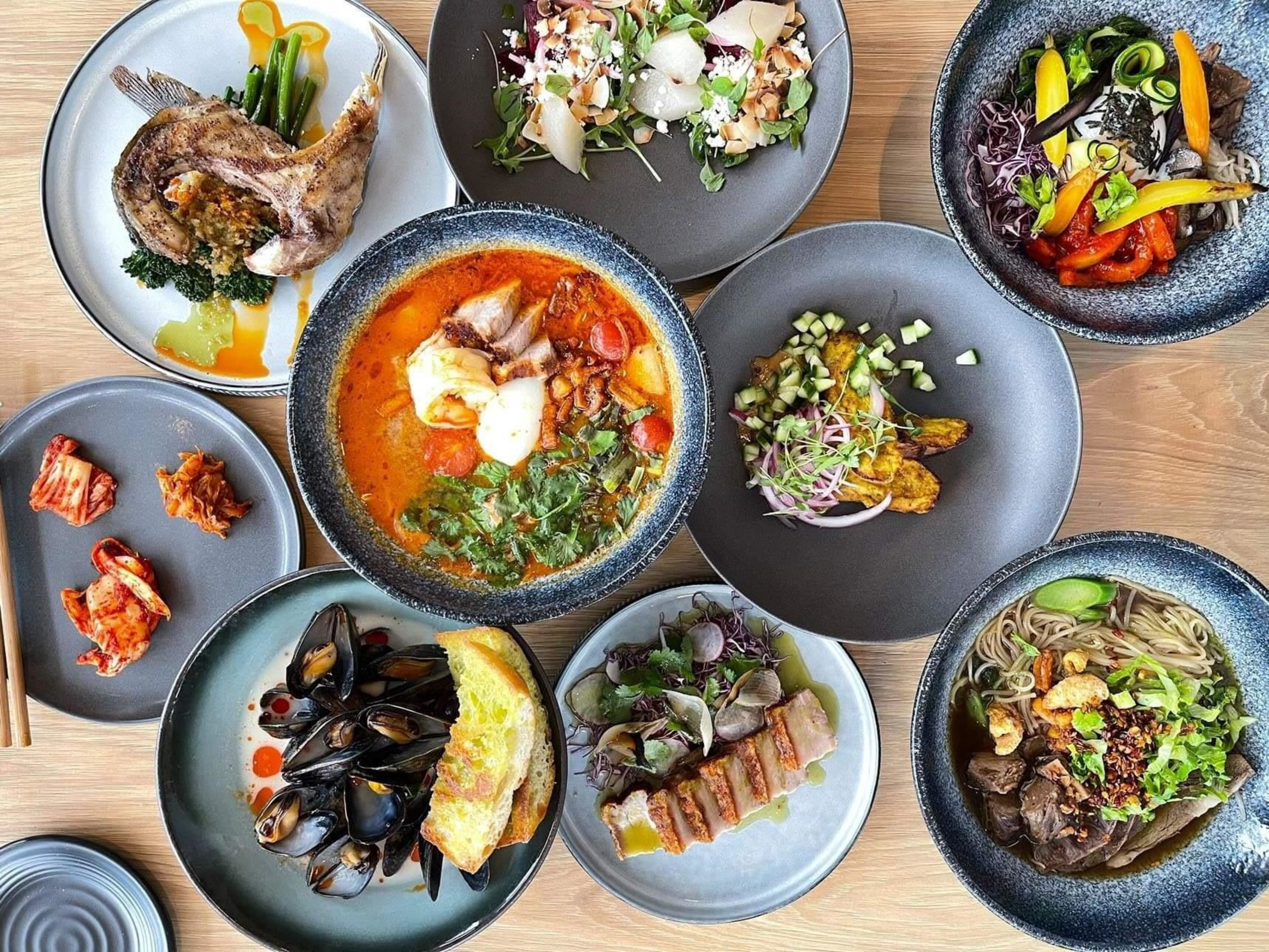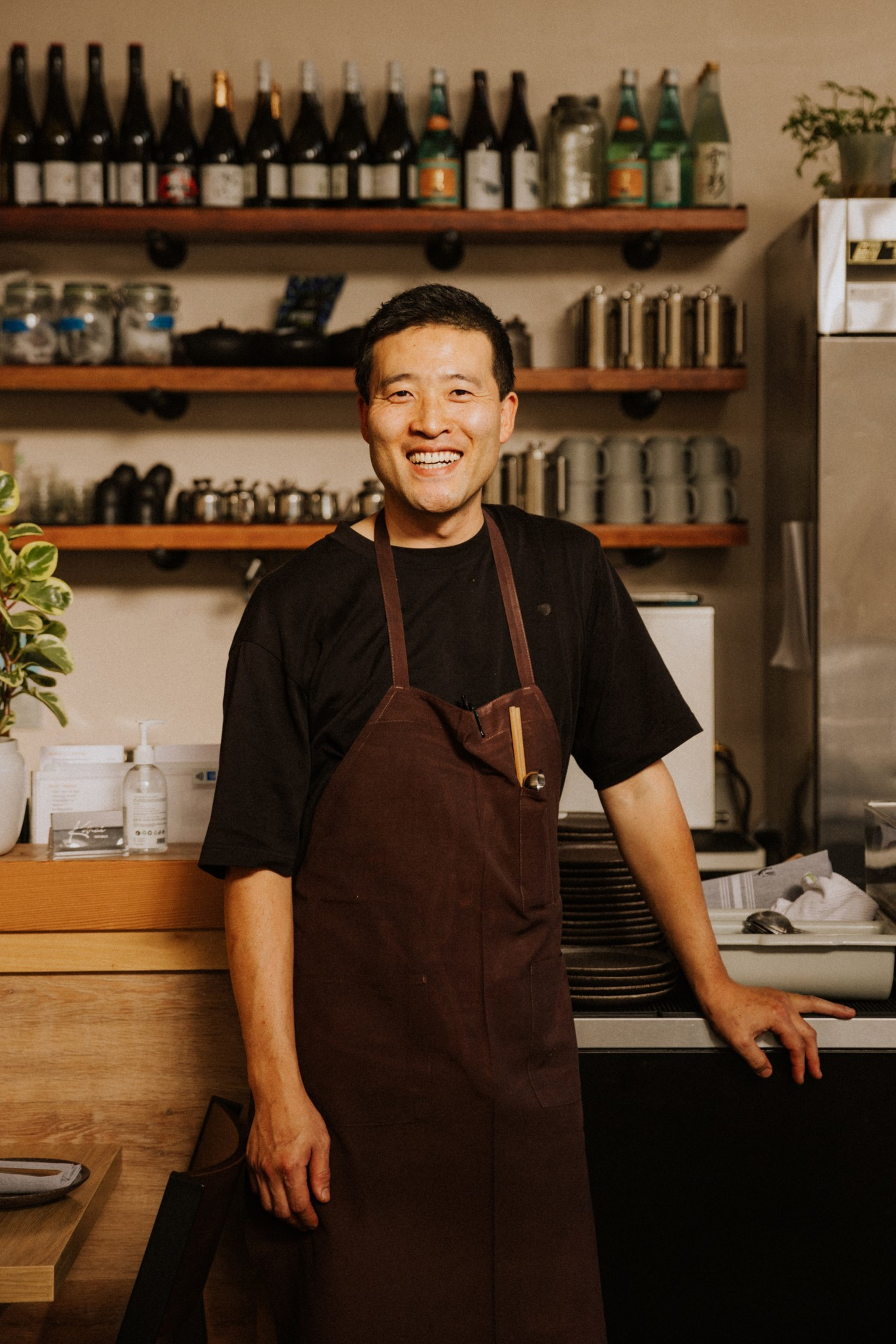When three trusted food-industry friends independently tell you to get yourself to Kothai Republic, it is a sign of something good to come.
The Inner Sunset restaurant is owned by chef Sung Park, who is Korean, and his partner and unofficial chef de cuisine Anantachai Sanguanwong (aka Gof), who is Thai (hence the portmanteau Kothai). However, Park doesn’t define the restaurant as strictly Asian. He sees it as being ingredient-forward “California cuisine” first. His goal was to open a neighborhood spot in the style of the city’s popular ’90s establishments that I’d say were categorized back then as “fusion,” featuring eclectic menus freed from the burden of regionality.
So, yes, there are classic Korean dishes, like kalbi for two ($48) and bibimbap ($25), and there’s Thai tom yum noodle soup ($26). But there are also dishes that mix it up, like porchetta with lilikoi jam ($29) and chicken liver mousse with mochi popovers ($16). Romesco, the classic Catalonian sauce made with red bell peppers, garlic, and almonds, is successfully punched up with mugeuniji, kimchi that Sung has fermented for a year, and served with locally grown summer squash, butter beans, and Thai basil ($13).

Park’s sophisticated sensibility belies the fact that he’d never worked in a kitchen until he decided to go it alone. He came of age in the industry at Thanh Long, the Cliff House, and Boulevard, but he worked in the front of the house. When he eventually got behind a stove, it was to run a food truck called Spork and Stix for a few years with his wife. When the pandemic was waning, he decided to leap on one of the spaces left vacant by a shuttered restaurant, opening Kothai in 2022. He was ready for a challenge.
The night my companions and I arrive at Kothai, the Sunset is socked in by fog — visibility zero. But inside the simple, high-ceilinged, window-lined space, it is cozy and candlelit. We start with slices of Pacific halibut sashimi wrapped in licorice-y perilla leaves ($15) with chojang (gochujang and rice vinegar) and delicate little stems of minari (water parsley) — “something like you’d have a seafood market in Korea,” Park says. Even more addictive is a sweet-spicy fish crudo ($21) with mango-citrus coulis, slices of Fresno chile, fennel, and tart cape gooseberries, also known as goldenberries.


My companions are already swooning. But then an entree arrives that makes the whole table go nuts. An Umpqua Valley (opens in new tab) lamb shank ($39), braised till buttery, is cooked in the style of northern China — well, kinda. Per usual, Park takes liberties, slow-cooking the lamb with Sichuan peppercorns, cumin, thyme, curry powder, and palm sugar and placing it atop smoky roasted eggplant. The sauce is deeply addictive and served with roti for mopping. It took him a month to perfect the recipe. “Not having culinary training, it takes me a while to get there,” he says. He intends to soon swap out the shank for lamb neck ($32), which will have an even more rich, gelatinous texture.
A heart-on-sleeve guy, Park clearly wants his restaurant to be more than just delicious; he wants it to be a part of the community. He spends the evening stopping at tables to say hi, dropping off food for guests to taste. After all, this is his labor of love, his side of town. The freckle-dusted chef’s family immigrated from South Korea in 1986, when he was 3. “We actually lived in a liquor store that my parents worked at in the Outer Sunset,” he says. “We didn’t even have a proper bathroom.” Eventually, they moved to a house down the street. Park and his family still reside on this block.
The restaurant is full and lively on the night I’m there, but sometimes, as at so many restaurants in the city these days, it is not. Sung says he and his wife have sunk their life’s savings into Kothai, and though it has been a fraught couple of years — he knew it would be hard, but maybe not this hard — he remains a San Francisco romantic. “I’m excited about everything still,” he says. “I’m so grateful when people choose our place to connect.”
